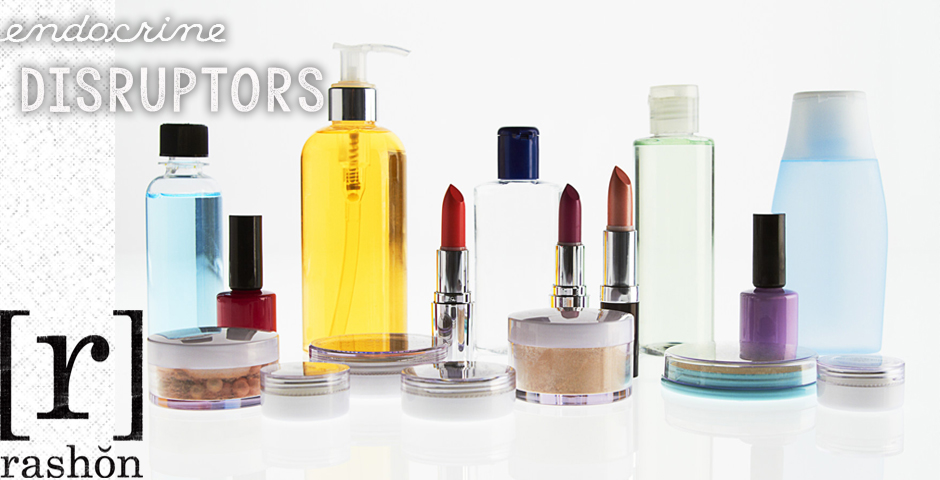In Part 1 of this series, I explained what the Endocrine System is, and what endocrine disruptors do in the body. Simply put, endocrine disruptors mess with our hormones, causing all sorts of health issues including: adrenal fatigue, hypothyroidism (along with Hashimoto’s), hyperthyroidism (including Grave’s Disease), pituitary malfunction, sexual dysfunction, diabetes, weight gain and more. When the endocrine system is disrupted, overworked or thrown off balance, a whole host of health issues can pop up.
Check out the Environmental Working Group’s Dirty Dozen Endocrine Disruptors for specific ingredients/chemicals to avoid. Their list is comprehensive and contains tons of info, so I highly recommend checking that out. Just a few of things you want to steer clear of are BPA, dioxin, atrazine, phthalates, parabens, perchlorate and lead. Avoiding these chemicals is critical for better health and healthier living.
7 Common Sources of Endocrine Disruptors
- Personal Care Products. I consider this category among the most important to begin replacing with safer alternatives. Remember that your skin absorbs 60+% of everything you put on it, and all those chemicals go straight to your bloodstream! Shampoo, conditioner, moisturizers, cosmetics, sunscreens – any products you use on your skin are typically filled with all the chemicals you should be avoiding. I recommend finding a few product brands that you like and begin replacing your old products with new ones. Did you know that the last legislation concerning personal product regulation in this country was in 1938? Unbelievable, if you ask me. The European Union has banned the use of 1,400 ingredients in personal care products. In the United States, there are 11 ingredients banned. Yes, you read that right – 11. I personally love Beautycounter products. They have a list of over 1,500 chemicals that they will NEVER use in their products. I know that they are safe to use, and on top of that, they are high-performing and luxurious. I also love that I can get my skin care, hair care and cosmetics from one place. Acure also has great products. There are plenty of safer options out there – just take the time to do your research and find what works for you.
- Plastics. This includes plastic containers and plastic wrap. Plastic is especially dangerous when heated, as the chemicals in plastic leech out into the food or liquid that is in the container. Avoid heating leftovers up in plastic containers or with plastic wrap. This also applies to bottled water that may have gotten warm. Choose glass or stainless steel containers for both food storage and water/liquids. Side note: while not plastic, non-stick cookware is dangerous for the same reasons (chemicals leech when heated, not to mention that if you scratch or chip the coating, that also goes into your food and you end up eating it), so choosing cast iron, stainless steel or ceramic cookware is best.
- Conventionally Grown Fruit and Vegetables. Pesticides, herbicides and industrial runoff are found in conventionally grown produce. Choosing organic when possible helps to ensure not only less exposure to toxins, but more nutrient dense fruit and veggies as well. If budget is a concern, try to buy organic based on the EWG’s Dirty Dozen list. Buying organic frozen fruit and vegetables can be a budget saver as well. Also, don’t forget to shop your local farmers’ market for local, organic produce.
- Conventionally Farmed Meat, Poultry and Dairy. Regular meat, poultry and dairy products contain antibiotics, hormones, and industrial chemicals. Choosing organic, grass-fed, and free-range products can greatly reduce your exposure to harmful toxins. If budget is an issue, check your local farmers’ markets or local farms for farmers that are committed to raising animals in a healthy way. Oftentimes, these farmers offer great prices for beef, poultry, pork and dairy products.
- Canned Foods. Many food cans are lined with BPA, a well-known endocrine disruptor. Look for cans that are labeled BPA-Free, or avoid canned foods as much as possible. It is especially important to avoid canned tomatoes. The acid in the tomatoes causes the BPA, and other chemicals from the can, to leech directly into the tomatoes. To avoid this, choose the tomatoes packaged in boxes (they look similar to a box of chicken broth/stock).
- Water. Most of the water in our cities and towns is filled with chemicals. I talked more about our water supply and the effect on our bodies of the chemicals found in water here. It’s important to drink filtered water whenever possible. There are a lot of affordable water filters on the market. Don’t forget to consider putting filters on your bath/shower. Remember that our skin absorbs chemicals, too, so standing in the shower for 15 minutes, or soaking in a tub, gives our skin plenty of time to absorb toxins from our water supply.
- Cleaning Products. Regular cleaning products are filled with toxic chemicals. Choose greener products, or consider making your own. White vinegar is one of the best cleaners, and it’s super cheap. The internet is filled with cleaning product recipes. This also includes your laundry soap and dryer sheets – what’s on your clothes matters, too!
I know this list can make avoiding endocrine disruptors overwhelming, or even impossible. Just hang with me here! It’s not about making huge sweeping changes to everything you use, eat, drink or own. It’s about knowing the facts and making the changes that you are able to make, as you are able to make them. For example, choosing safer personal care products is a priority for me; however, my budget won’t allow me to buy all new products right away. As I run out of shampoo, I replace it with a safer alternative. I’m slowly, but surely, replacing all of those products. I’m applying that strategy across the board in our house. I buy things when I can, and know that one safer product is one less exposure to harmful disruptors.
What products are you going to try to replace in your household?





0 Comment